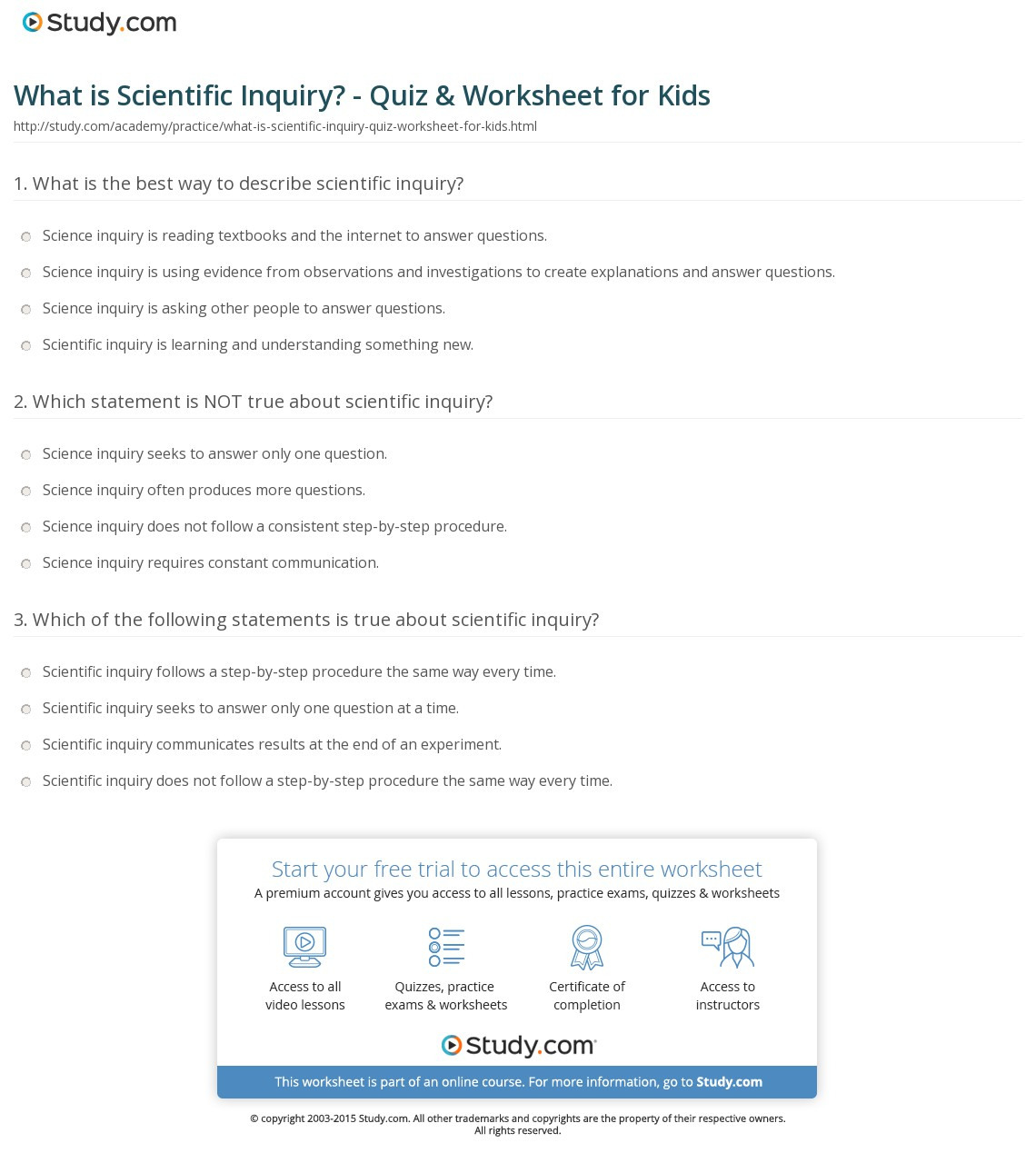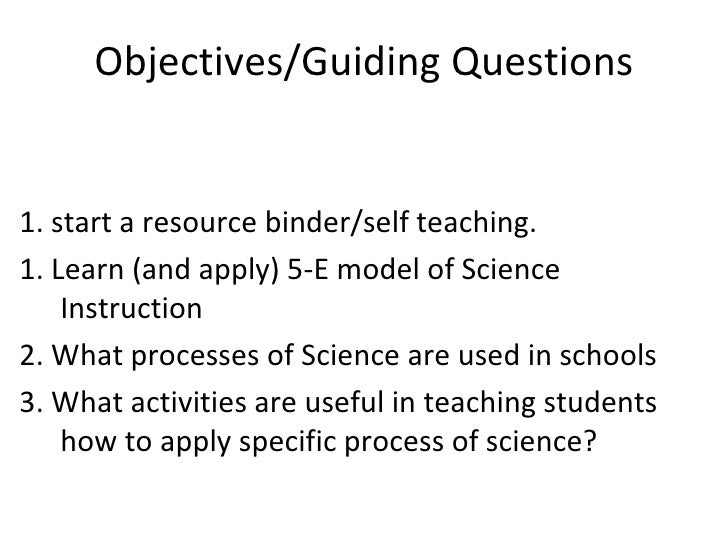45 inquiry into scientific thinking worksheet answers
PDF Principles of Scientific Inquiry The Scientific Method Although most of us have heard, at some time in our careers, that research must be carried out according to "the scientific method", there is no single, sc ientific method. The term is usually used to mean a systematic approach to solving a problem in science. Three types of investigation, or method, can be recognized: PDF Introduction to Biology Lab & Class Activity Worksheets SCIENTIFIC METHOD The Penny Drop Lab Introduction: Which side of a penny will hold more drops of water before spilling over on to a paper towel? OBJECTIVE: In this activity, you will use the scientific method of inquiry to perform a laboratory experiment. The basic parts of the scientific process include the following: 1. Make observations 2.
Printable Scientific Method Worksheets Scientific Method Worksheets All savvy scientists conduct experiments using the scientific method. This method allows for different observations to take place in order to prove one's theory in regards to the nature of science. It is important that students understand that they must investigate their theory by testing out their hypothesis.

Inquiry into scientific thinking worksheet answers
Science Inquiry Skills Teaching Resources | Teachers Pay ... Scientific Inquiry Process Skills Posters by Figuring It Out In Fifth 41 $2.00 PDF These posters are a perfect addition to your classroom decor that will help your students to better understand the scientific skills. This set includes a title page and 10 scientific processes. Each poster includes the process and a short description of what it is. ️ FREE Printable The Scientific Method Worksheets pdf On this free scientific method worksheet is a visual you will see the basic terms: Purpose - The question that needs to be answered or the problem that needs to be resolved. Research - The observing and collecting of evidence. Hypothesis - The best guess for how to answer the question or solve the problem. PDF 1.3 Scientific Thinking and Processes 1.3Scientific Thinking and Processes KEY CONCEPT Science is a way of thinking, questioning, and gathering evidence. MAIN IDEAS • Like all science, biology is a process of inquiry. • Biologists use experiments to test hypotheses. • A theory explains a wide range of observations. VOCABULARY observation,p. 13 data,p. 14 hypothesis,p. 14
Inquiry into scientific thinking worksheet answers. › resource › t3-sc-341-namingYear 8 Science Naming Scientific Equipment Worksheet - Twinkl This lab equipment worksheet resource features two worksheets with answers included for each. The first worksheet depicts illustrations of all the common lab equipment that you would expect to find when you are setting up a scientific experiment in a classroom. For example, a Bunsen burner, a beaker, a measuring cylinder, a tripod, a heatproof mat, a test tube rack, a safety mat, a pair of ... Scientific Thinking Worksheets & Teaching Resources | TpT These questions are designed to encourage creative and outside-of-the-box thinking in your class. They are great as centers (use the coloured sheets and laminate) or as hand out pintables (use the black and white sheets) These activites are great for early finishers, enrichment tasks, homework or Subjects: PDF Inquiry Into Scientific Thinking Inquiry Into Scientific Thinking The 10 Percent Rule Food chains show the path of energy through an ecosystem. As you move through the food chain, energy is lost. Scientists estimate only 10 percent of energy passes from one level to the next. This is why most food chains are not very long. 1. Look at the four empty 2-liter water bottles shown ... PDF Learning Teaching Scientific Inquiry - NSTA An increasing number of researchers in science education believe that the conven- tional way of defining scientific inquiry—by focusing on the activitiesof scientists—is mis- taken, and this mistaken focus has resulted in classroom practices that do not do enough to authentically reflect the discipline of science.
Сritical Thinking Skills - Analysis, Interpretation, Inference Here are five common and impactful critical thinking skills you might consider highlighting on your resume or in an interview. Observation. Web Application. Analysis. Web Application. Inference. Web Application. The Critical Thinking Process. You should be aware that none of us think critically all the time. PDF Inquiry Practice: Questions - BSCS Science Learning What is a good scientific inquiry question? First, it is true that you can inquire about anything, but you cannot do scientific inquiry about just anything. Scientific questions focus only on events in the natural world (and not the spiritual world, for example). The questions are about objects, organisms, and patterns and they are Scientific Inquiry Activities Teaching Resources | TpT Scientific Method Inquiry Activity with MM's- Experiment Introduction by Scienceisfun 159 $3.00 Zip In this introductory inquiry activity, students will see that when an MM is placed in water, the sugar and color coating dissolves and spreads out in a circular pattern around the MM. PDF Asking Good Scientific Questions - University of Kentucky Good scientific questions are defined, measurable, and controllable. Tips on Asking Good Scientific Questions 1. Begin by asking several questions about a topic. 2. Eliminate questions that cannot be answered by direct observation or by gathering evidence. 3. Break broad questions into smaller questions that can be investigated one at a time. 4.
DOC Lesson 1 | Scientific Inquiry Scientific Inquiry A. Understanding Science 1. The investigation and exploration of natural events and the new information that results from those investigations is called . 2. Marie Curie was a scientist who won two Nobel prizes in the early 1900s for her work with . B. Branches of Science 1. The study of matter and energy is called . 2. PDF Chemical Sciences Physical Sciences Biological Sciences ... Answers: (Inquiry point 2) Crumpling paper; Shaping glass; Making a salad Explore this: highlights the fact that any phase change is a physical change, as illustrated by the equation representing ice melting. CHEMICAL CHANGES 5 minutes Similarly to the last page, students identify the chemical changes amongst the examples. Answers: (Inquiry ... DOCX Saint Louis University : SLU Courses will teach students about—and require students to engage in—the different ways of thinking through which scholars study and apply scientific principles to answer questions about the structure and behavior of the natural world or engineering, medical, or computer science applications PDF Second Grade First Quarter Thinking Like a Scientist Second Grade First Quarter Thinking Like a Scientist Grade Band Theme: Observations of the Environment This theme focuses on helping students develop the skills for systematic discovery to understand the science of the physical world around them in greater depth by using scientific inquiry. Topic: Thinking Like a Scientist
Scientific inquiry Flashcards - Quizlet Does scientific inquiry have to be carried out in a specific order, or can multiple activities be carried out at the same time? Multiple, however, they must be in the clockwise order. Discovery of flies and maggots on a piece of meat. Scientific inquiry. Where did the flies and maggots come from?
› worksheets › series-dcSeries DC Circuits Practice Worksheet with Answers Worksheet ... Instead, she has access to several “power supply” units which convert 120 volt AC power from a power receptacle into low-voltage DC power that is adjustable over a range of 0 to 15 volts. Each of these power supplies is a box with a power cord, voltage adjustment knob, and two output terminals for connection with the DC voltage it produces:
PDF Teaching About Scientific Inquiry and The Nature of ... scientific inquiry and the nature of science, describe the rationale for teaching about these important aspects of science, and outline how scientific inquiry and the nature of science may be effectively addressed in K-12 classrooms. of Science Hypothesizing Experimenting science. Figure 1. Three components of scientific literacy.
pfarrei-burrweiler.deVirtual density lab worksheet answers Barbie pegasusun sihri tek parça türkçe dublaj izle Not defteri lisans Eylül barbie pegasusun sihri izle
Inquiry Worksheets Teaching Resources | Teachers Pay Teachers This is a recording sheet/graphic organizer that students can use to record their thinking throughout all 3 acts of any of the 3-Act Tasks from Graham Fletcher. 3-Act Tasks are inquiry-based math problems that are based on real-life scenarios. They are super fun and engaging and are available across grades K through high school.
study.com › learn › lessonDivergent Thinking | Examples - Video & Lesson Transcript ... Aug 03, 2021 · Divergent Thinking. Divergent thinking definition is a problem-solving process where several different potential solutions are developed. What is divergent thinking? It is a free-flowing ...
› blog › science-inquiry-claimDesigning Science Inquiry: Claim + Evidence - Edutopia Sep 25, 2012 · A claim that answers the question Evidence from students’ data Reasoning that involves a rule or scientific principle that describes why the evidence supports the claim Your students might suggest this explanation: Air is matter (claim). We found that the weight of the ball increased each time we pumped more air into it (evidence).
DOC Scientific Method Quiz - thomas.k12.ga.us List the steps of the scientific method in order. 1. 2. 3. 4. 5. 6. 7. Word Bank 8-10: Retest Conclusion Observations 8. The part of the scientific method in which you answer your questions and share your results. _________________________________________________________ 9.
PDF The REAL scientific method (and asking the right questions) Reflecting on the Nature of Science Think for 1 minute and write down ideas Pair: Talk with a neighbor about ideas for 1 minute Share: Share with the class Think about one of the science practices your group used in the "Mystery Tube" activity yesterday morning and how it was used.
positivepsychology.com › appreciative-inquiry-tools4 Appreciative Inquiry Tools, Exercises and Activities Feb 05, 2022 · Image by rawpixel from Pixabay. Appreciative inquiry is about looking for the best in people – in the way they work, they live, and they behave.. Initially, appreciative inquiry (AI) was a “fundamental shift in the overall perspective of organizational development that took into account the entire human functioning – including strengths, possibilities, and success.”
Lesson 2 - The Scientific Method & Inquiry-Based Learning ... Inquiry-based science adopts an investigative approach to teaching and learning where students are provided with opportunities to investigate a problem, search for possible solutions, make observations, ask questions, test out ideas, and think creatively and use their intuition. In this sense, inquiry-based science involves students doing ...
nap.nationalacademies.org › read › 4962Reading: National Science Education Standards |The National ... Students at all grade levels and in every domain of science should have the opportunity to use scientific inquiry and develop the ability to think and act in ways associated with inquiry, including asking questions, planning and conducting investigations, using appropriate tools and techniques to gather data, thinking critically and logically ...

17 Best images about Scientific Method on Pinterest | Teaching, Scientific method activities and ...
1.3 Scientific Thinking and Processes - Reviewing ... Scientific Process Why is the statement "All life is made of cells" an example of a theory? The idea that all life is made of cells changed the way scientists thought about what defines an organism. Not only did it encompass all accumulated evidence, but it also provided a framework for new investigations.
PDF Inquiry Guide - Welcome to Journey North 1. Open-Ended Questions That Inspire Scientific Thinking 2. General Strategies for Facilitating Discussions Overview Discussing ideas, data, "ahas," and possible explanations is vital to inquiry-based learning and it reflects the way scientists work. Full- and small-group discussions build community and allow students to explore












0 Response to "45 inquiry into scientific thinking worksheet answers"
Post a Comment